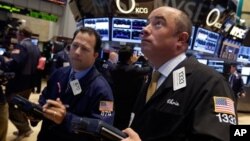U.S. economists are predicting that policy makers at Federal Reserve are on the verge of beginning to trim the economic stimulus measures they have used to boost the American economy from the depths of the 2009 recession.
Top officials of the U.S. central bank started a two-day meeting Tuesday in Washington to decide whether to reduce their $85-billion-a-month purchase of securities to pump more money into the economy. One leading American economist, Jim O'Sullivan of High Frequency Economics, said he expects the Fed to cut the asset purchases by $10 billion a month.
"All signs at this point suggest that they will start tapering, and start winding down the purchase program. Of course, right now they're buying $85 billion per month in securities, so they'll start pulling that number down, probably not by a huge amount," said O'Sullivan. "I'm guessing they'll clip it to maybe $75 billion a month from $85 billion. So they're certainly not tightening at this point, but they're going to at least slow down the rate of easing."
Another economist, Mark Vitner of the large Wells Fargo Bank, said the U.S. economy, the world's largest, is advancing, even if it is not fully recovered from the country's worst economic downturn since the Great Depression of the 1930s. He said that with improvement in the economy, the central bank is looking to shrink its role as a spur to economic growth.
"I think they very much want to begin to normalize monetary policy. And right now it's exceptionally easy, even though the economy, you have a hard time saying that it's exceptionally weak. It's not strong, not strong by any stretch of the imagination, but it's strengthening, and it's moving in the right direction. It's time that monetary policy begins to do the same thing," said Vitner.
Even with the improvement of the U.S. economy, job growth has been sluggish in recent months, and some workers have given up their search for employment. The country's jobless rate has dipped to 7.3 percent - the lowest since late 2008, but still well above the historical norm of less than 6 percent.
The country's stock markets have recovered from the recession, though, with major indexes near all-time highs. Major corporations have been reporting hefty profits.
The Fed plans to announce any policy changes on Wednesday.
Top officials of the U.S. central bank started a two-day meeting Tuesday in Washington to decide whether to reduce their $85-billion-a-month purchase of securities to pump more money into the economy. One leading American economist, Jim O'Sullivan of High Frequency Economics, said he expects the Fed to cut the asset purchases by $10 billion a month.
"All signs at this point suggest that they will start tapering, and start winding down the purchase program. Of course, right now they're buying $85 billion per month in securities, so they'll start pulling that number down, probably not by a huge amount," said O'Sullivan. "I'm guessing they'll clip it to maybe $75 billion a month from $85 billion. So they're certainly not tightening at this point, but they're going to at least slow down the rate of easing."
Another economist, Mark Vitner of the large Wells Fargo Bank, said the U.S. economy, the world's largest, is advancing, even if it is not fully recovered from the country's worst economic downturn since the Great Depression of the 1930s. He said that with improvement in the economy, the central bank is looking to shrink its role as a spur to economic growth.
"I think they very much want to begin to normalize monetary policy. And right now it's exceptionally easy, even though the economy, you have a hard time saying that it's exceptionally weak. It's not strong, not strong by any stretch of the imagination, but it's strengthening, and it's moving in the right direction. It's time that monetary policy begins to do the same thing," said Vitner.
Even with the improvement of the U.S. economy, job growth has been sluggish in recent months, and some workers have given up their search for employment. The country's jobless rate has dipped to 7.3 percent - the lowest since late 2008, but still well above the historical norm of less than 6 percent.
The country's stock markets have recovered from the recession, though, with major indexes near all-time highs. Major corporations have been reporting hefty profits.
The Fed plans to announce any policy changes on Wednesday.





